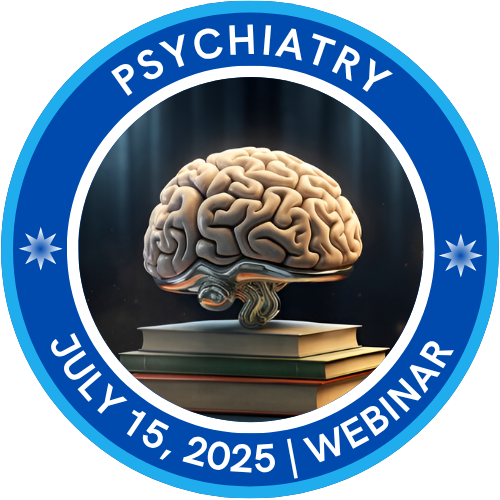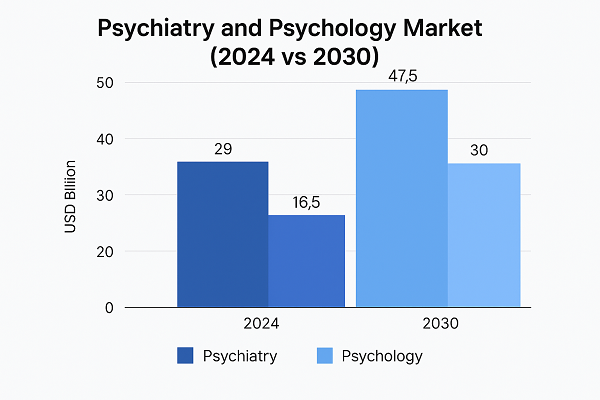Welcome to the 2nd Webinar on Psychiatry and Psychology, taking place on July 15, 2025 - a global platform where compassion meets science, and every insight paves the way for mental wellness. We're honored to bring together psychiatrists, psychologists, mental health professionals, and advocates to exchange knowledge, highlight advancements, and inspire impactful conversations. This webinar is more than just a session; it's a united effort to elevate practices, foster collaboration, and improve mental health outcomes worldwide. Together, let's honor foundational wisdom, embrace new discoveries, and shape a more resilient and mindful future.

Join us for the 2nd Webinar on Psychiatry and Psychology, taking place on July 15, 2025, focused on advancing mental health care and psychological well-being. This virtual event will bring together psychiatrists, psychologists, mental health professionals, researchers, and students to explore the latest developments in the diagnosis, treatment, and prevention of mental health disorders. Key topics will include mood and anxiety disorders, cognitive-behavioral therapies, neuropsychology, child and adolescent mental health, and emerging trends in psychiatric research. Attendees will gain valuable insights into innovative therapeutic approaches, integrated care models, and the impact of mental health on overall well-being. The webinar will feature live Q&A sessions, expert panel discussions, and interactive presentations, offering participants an opportunity to engage with leading voices in psychiatry and psychology. Whether you're a healthcare provider, academic, student, or someone interested in mental health, this event provides essential knowledge and practical strategies to support mental wellness and psychological resilience.
Psychology is the scientific study of behavior and mental processes, encompassing a wide range of topics that explore how individuals think, feel, and act. It aims to understand both the conscious and unconscious mechanisms that shape human actions, emotions, and cognitive functions. Psychologists use various methods, including experiments, observations, and case studies, to explore these aspects.
It deals with a wide range of conditions that can affect a person's mood, thinking, and behavior, often with a biopsychosocial approach, which considers biological, psychological, and social factors.
Psychopharmacology examines the effect of medications on mental health, behavior, and brain function. It involves the development and testing of new drugs, understanding their mechanisms of action, and exploring their efficacy and safety in treating psychiatric conditions. The field also delves into how different drugs impact neurotransmitters, neuroreceptors, and neural circuits in the brain, providing insights into the biology behind psychiatric disorders.
Neurobiology investigates how brain circuits, neurotransmitters, hormones, and structural changes in the brain influence behavior, cognition, emotions, and psychological functions. Advances in neuroimaging, genetics, and molecular biology have provided deeper insights into how mental illnesses manifest at the cellular and systems levels, improving both diagnosis and treatment strategies.
Integrative approaches in psychiatry within primary care involve the combination of psychiatric treatment with other therapeutic modalities (such as psychological interventions, social support, and lifestyle changes) within the context of a patient's overall health. This holistic method aims to treat the whole person, addressing both mental and physical health in a coordinated manner. By improving communication between primary care providers and mental health specialists, integrative approaches ensure early identification and effective management of mental health issues.
Geriatric psychiatry is a specialized branch of psychiatry that focuses on the diagnosis, treatment, and prevention of mental health disorders in older adults. As the global population ages, the demand for specialized care for this demographic increases. Geriatric psychiatry addresses a variety of complex mental health issues that are unique to older adults, such as dementia, depression, and anxiety, often compounded by physical health issues, polypharmacy, and the social challenges of aging. Innovations in geriatric psychiatry focus on advancing diagnostic tools, therapeutic interventions, and improving the overall well-being of older patients.
Suicide prevention and crisis intervention are critical aspects of mental health care. These strategies focus on identifying individuals at risk, providing immediate support, and ensuring long-term therapeutic interventions. Below is a comprehensive description along with key subtopics related to suicide prevention and crisis intervention from both psychiatric and psychological perspectives.
It's focuses on the mental health and developmental issues affecting children and teenagers. Early detection and intervention are crucial for addressing emotional, behavioral, and psychiatric conditions in young people. This field involves assessing and managing a wide range of mental health conditions such as depression, anxiety, ADHD, autism spectrum disorders, and eating disorders. Early management strategies aim to improve long-term outcomes by identifying issues early and providing appropriate therapeutic interventions.
Trauma-Informed Care is an approach to healthcare that recognizes and responds to the impact of trauma on an individual's mental, emotional, and physical well-being. It integrates an understanding of the prevalence of trauma, its effects, and the potential paths to healing. In Psychiatry and Psychology, trauma-informed care aims to provide sensitive, compassionate, and empowering treatment to those who have experienced trauma. When trauma is not addressed, it can result in mental health conditions such as Post-Traumatic Stress Disorder (PTSD), which requires specialized management.
Forensic Psychology and Criminal Behavior Analysis is a field that combines the principles of psychology and psychiatry with the legal system to understand criminal behavior and assist in legal decision-making. It involves the study of how psychological principles and methods can be applied to criminal investigations, legal proceedings, and the treatment of offenders.
It's is a process that involves evaluating an individual's behavior, personality, cognitive abilities, emotional functioning, and mental health. It is used to diagnose mental disorders, plan treatments, and provide a clearer understanding of a person's psychological state. In the fields of psychiatry and psychology, various techniques and tools are used to assess different aspects of an individual's psychological functioning.
Behavioral addictions encompass a range of activities where individuals engage in excessive, compulsive behaviors despite negative consequences. In the context of psychiatry and psychology, behavioral addiction is characterized by a loss of control, persistent engagement with the behavior, and continued engagement despite detrimental impacts on social, occupational, or other important areas of functioning.
Mindfulness-Based Cognitive Therapy (MBCT) is a therapeutic approach that combines aspects of cognitive behavioral therapy (CBT) with mindfulness practices, aimed at preventing relapse in people who have recovered from depression and other mood disorders. The core of MBCT is cultivating mindfulness through meditation and awareness exercises, which helps individuals become more aware of their thoughts, emotions, and bodily sensations. This awareness allows them to break the cycle of negative thinking patterns that often lead to depression, anxiety, and stress.
The intersection of neurology and psychiatry involves the study of disorders that are both neurological (originating in the brain or nervous system) and psychiatric (affecting thoughts, emotions, and behavior). Many mental health conditions have a biological basis that can be linked to neurological processes. Conditions like depression, anxiety, schizophrenia, and bipolar disorder often have both psychological and neurological components. Similarly, neurological disorders like Parkinson's disease, multiple sclerosis, and epilepsy can also lead to psychiatric symptoms such as mood changes, psychosis, or cognitive decline.
Artificial Intelligence (AI) in mental health diagnostics is revolutionizing the way mental health conditions are identified, understood, and treated. With the ability to analyze vast amounts of data, AI can help clinicians make more accurate diagnoses, provide personalized treatment plans, and improve patient outcomes. AI technologies, such as machine learning, natural language processing (NLP), and neural networks, are being utilized to assess mental health by analyzing patterns in behavior, speech, facial expressions, and even social media activity. This shift offers the potential for earlier detection and more efficient management of psychiatric and psychological conditions.
Mental Health and Climate Change: Psychological Impacts explores the growing body of evidence linking environmental changes to mental well-being. Climate-related disasters, displacement, and eco-anxiety are increasingly affecting individuals and communities worldwide. This topic examines how climate stressors contribute to psychological disorders, the role of mental health professionals in addressing these issues, and strategies for building psychological resilience in the face of environmental crisis.
It refers to an individual's personal sense of their gender, which may or may not align with the sex assigned at birth. Mental health challenges can arise due to gender dysphoria, social stigma, discrimination, lack of access to supportive care, and internal conflict. Psychiatry and psychology play critical roles in supporting individuals through assessment, counseling, and treatment for mental health conditions related to or influenced by gender identity.
Psychosomatic disorders involve physical symptoms that are either caused or worsened by mental factors such as stress, anxiety, or depression. These conditions highlight the intricate link between the mind and body, where psychological distress manifests as real physical ailments. Diagnosis and management require a collaborative approach combining psychiatric evaluation and psychological therapies, along with medical assessment to rule out organic causes.
Workplace Mental Health and Organizational Psychology is a multidisciplinary field focused on understanding, promoting, and managing mental well-being within professional environments. It draws from both clinical psychiatry and psychological research to address how workplace structures, cultures, and interpersonal dynamics impact employee mental health, productivity, satisfaction, and organizational effectiveness. The aim is to create psychologically healthy workplaces that prevent mental distress and support resilience, performance, and engagement.

Our webinars are thoughtfully designed to deliver value to a wide range of individuals. Whether you're looking to grow your skills, explore new opportunities or gain insights from experts, here's who will benefit most from attending:

In a world where knowledge is power, webinars have emerged as one of the most accessible and impactful ways to learn, grow and connect. Don't miss the chance to learn, grow and connect in ways that truly matter.

Registering for a webinar is essential to gain access to the unique opportunities and secure a chance to grow, connect and gain insights that can drive your personal and professional success. Webinars are more than just online meetings, they're gateways to knowledge, innovation, and growth.

The global psychiatry and psychology markets are experiencing steady growth, with the psychiatry market valued at approximately USD 27-30 billion in 2024 and projected to reach USD 45-50 billion by 2030, while psychology services are expected to grow from USD 15-18 billion to over USD 30 billion in the same period, driven by increased awareness, rising mental health disorders, and the expansion of telehealth platforms. Key growth regions include North America, Europe, and Asia-Pacific, with digital innovations such as AI-powered diagnostics, virtual therapy platforms, and personalized neuropsychiatric treatments playing a major role in shaping the future. The markets are also seeing rising demand for child, adolescent, and geriatric care, along with growing corporate mental health initiatives. However, challenges such as stigma, workforce shortages, and inconsistent insurance policies persist, especially in developing regions. Stakeholders are encouraged to invest in digital tools, expand remote services, and align with evolving patient expectations and technological advancements to remain competitive in this rapidly evolving landscape.